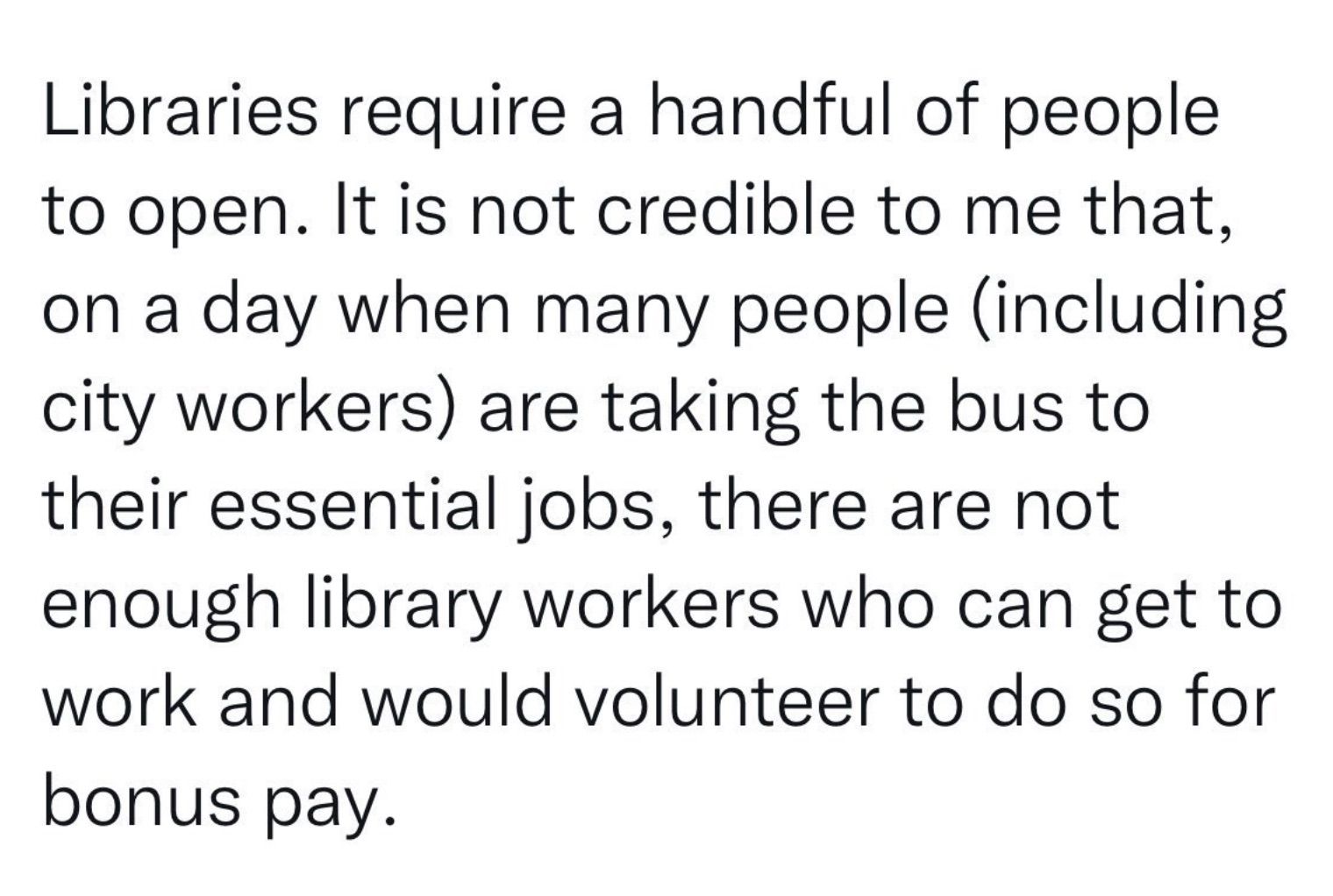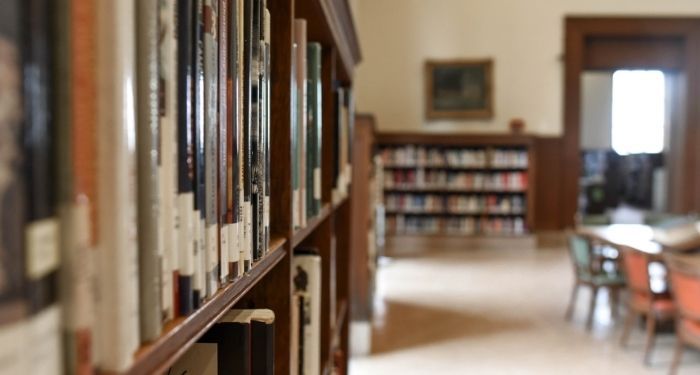Library workers can’t self-care themselves out of systemic problems, but in a world where public libraries have become a catch-all social safety net, little is being done to ensure front-line workers are being protected themselves. From continuing to operate within the “new normal,” to being excluded from city- and county- wide vaccine mandates, to being expected to operate on their closed dates to play the role of warming shelter, to passing out COVID tests and masks (and receiving said tests returned to their book drops or having them done right on library property), to closing because of a lack of staff due to COVID or over a decade of relentless budget cuts and austerity restructuring, the demands on public libraries to operate as the solution to a lack of funding and services across society is taking a tremendous toll.
Public libraries provide essential resources, but they’re not essential services. After being told this for decades by cities across the U.S. and having budgets slashed, it’s impossible not to see how now, in a time when foundational services have disappeared completely, those same governments are telling public libraries to do those jobs, too.
The fact of the matter is, public library workers are not equipped to do the roles of anything other than those in which they’re trained.
One of the first things those who work the front lines in public libraries learn is that they’re there to provide access to the resources, not answers. A patron seeking information about how to get legal help on a matter, for example, can’t ask the librarian for their input. Instead, the librarian can lead them to the appropriate legal resources.
And yet, we see every day in the news and on social media how the same libraries should be doing more to ensure their communities have all of their needs met. The profession, which remains female-dominant, takes the role of caretaker, much in the same way the nursing and teaching professions do. These are callings, vocations that inspire tremendous awe when it’s convenient and, during times of extended crisis like now, ravenous ire.
Libraries provide something unavailable in too many areas across America: a safe place to be, a warm place to be, and a place that serves as one of the few in the country where you aren’t asked to partake in capitalism to simply be within them. This is a tremendous privilege and responsibility to undertake in non-emergency times, but in times of catastrophe, it’s amplified. That amplification shines a light into not just the cracks in the library’s foundation, but the complete holes in the larger structure of government and social safety nets.
And so, front line library workers carry the burden of underpaid, underappreciated, underfunded work because it’s become expected of them, and being a profession founded on the principles of access, a profession of vocational awe, and a profession dominated by the helping class, it’s become a weapon used against them.
Take the example of a viral tweet recently, wherein an author was frustrated by the closure of the Seattle Public Library during a winter snow emergency. The library — designated a warming center by the city — wasn’t opening, and therefore was not helping those without access to a warm space to be. Many jumped into the conversation, increasingly angry, about the fact librarians didn’t show up to work in order to ensure that people would stay warm. Even if it was claimed they would “make extra money” doing so. Didn’t they care about the less fortunate? Those without homes?

A designation as a warming shelter by the city of Seattle doesn’t override the fact that the libraries were scheduled for closure the day of the emergency. It doesn’t override the fact that it’s dangerous for staff to travel if it’s dangerous for anyone else to travel. A designation that doesn’t override the fact that COVID impacts employees in the library, especially those working on the front lines with people every single day. It also conveniently overlooks the fact that the library has created resources to help people when the library is closed, including a list of other warming centers.
But what’s more, rather than direct the ire that the city doesn’t adequately fund or create safe spaces for the houseless population — Seattle’s city government actively funds sweeps of encampments that the houseless develop — library workers are called out as not caring enough about those who need them most.
And in a world where the 2021 Seattle budget offers roughly $440,000,000 to police but only $86,000,000 to libraries, is there “bonus pay” for the “few” librarians who’d make the commute to bandage a gaping wound that isn’t theirs alone to mend?
It’s a global pandemic, and while libraries are able to provide a safe space for the most vulnerable in the community, it shouldn’t be at the expense of themselves. Instead, this is the place where those working in public libraries need to continue doing things that seem counter to their mission of being the only safety net around. They need to close when understaffed. They need to close when there are weather emergencies. They need to demand city leaders and city media reconsider them as the last place of refuge for getting goods and services to an entire community. It helps no one when libraries get a small shipment of masks for distribution and they’re gone in an hour, and library workers endure 10+ more hours in a day, plus every other hour of that week and the following weeks, explaining that no, they ran out and no, they don’t know when they’re getting more, and no, the other branches don’t have them either.
But what good does the reality of what happens inside the library do if it can’t look good for a government’s failures of its people and a weakening legacy media’s desire for clicks?
Public libraries aren’t a panacea for decades of taking from the most vulnerable and giving to those with a priority of further harming those same vulnerable communities. It’s time for library workers to call in when they’re sick, to speak up when they’re asked to step into a role that’s not their own, and to encourage solutions that create a cohesive web of resources, people, and funding that don’t fall entirely upon them.
The solutions exist. But we have to want to listen to those on the front lines to make them happen, and right now, too many are more interested in their platonic ideals of what librarianship is, rather than the realities of how the institution and its best, brightest, and most capable people are calling it quits and walking away.
Instead, library workers are told to practice self care as a solution to the crisis. If they just create a vision board for what they need, they can manifest it into reality — this isn’t a joke, but a real suggestion during a staff meeting at a major city public library system when staff brought up a lack of resources, being understaffed, and being overworked in the midst of a global pandemic.
Workers are told they don’t care enough if they put on their own masks first before putting on the masks of others. That their job is to be the invisible force behind ensuring social services exist in any capacity, even if it’s crumbling.
Maybe that decades-long lie about how librarianship is a growing field with tremendous retirements to come is playing out now a little differently than intended.
